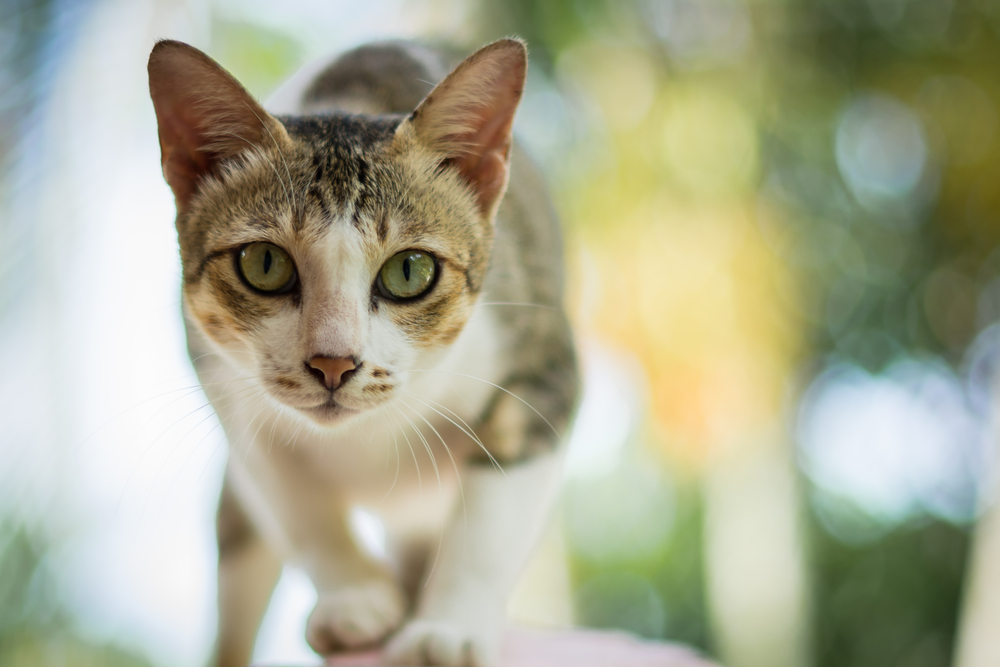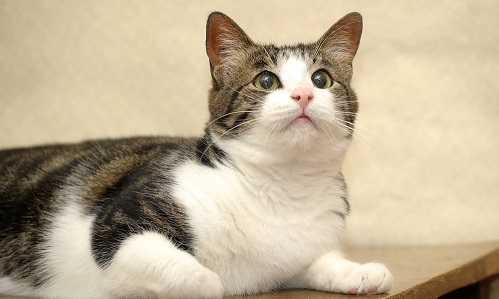No one wants to hear that their fur baby has any sort of health issue—especially not one that affects their heart!
However, heart murmurs—abnormal heart sounds—are relatively common in both kittens and adult cats.1
In some cases, heart murmurs resolve on their own. In others, they point to a more serious underlying issue. Because these abnormal sounds can have several different root causes, it’s essential to consult with your veterinarian to determine a care plan.
In this short guide, we’ll go over potential causes and treatments for a feline heart murmur.
What is a Heart Murmur in Cats?
As we’ve already noted, heart murmurs refer to any abnormal sounds in your cat’s heart.
However, keep in mind that you won’t be able to hear or recognize a murmur on your own. When your veterinarian conducts a physical exam of your cat, they’ll use a stethoscope to listen to your cat’s heartbeat.
Heart murmurs come at different volumes and intensities:2
- A Level I heart murmur is a quiet swishing sound. The sound may last only a few milliseconds and can also be intermittent.
- A Level VI heart murmur is loud and audible whenever a stethoscope is pressed to the heart. It can also be felt through the cat’s chest.
- Level II-V heart murmurs fall somewhere in the middle of the scale in terms of volume, duration, and frequency.
When your vet detects a heart murmur, it can be quite worrying. But the first step is figuring out the cause.
The good news? Some heart murmurs disappear on their own.
Innocent Heart Murmurs
If your vet has observed a heart murmur without any additional symptoms, they’ll most likely ask you to return in a few weeks for another checkup and, if necessary, further testing.
Why?
In some cases, heart murmurs are “innocent” (harmless).3
- 6-8 week old kittens often develop heart murmurs that resolve when they are five months old. The murmurs are usually quiet and intermittent, coming in at level I-III.
- Some cats present a murmur due to the shape of their heart vessels (“physiological murmurs”). A physiological murmur is considered innocent if it does not result in further symptoms.
If a heart murmur disappears on its own, there is no need for further testing. However, if it comes up unpredictably, there may be another cause at play, whether related to physiology or stress.
Stress and Murmurs
How do you react to stress? Telltale signs in humans include sweaty palms, redness, and of course, a racing heartbeat.
Our feline friends are also prone to stress. Unfortunately, they don’t have an easy way to tell us what they’re feeling! However, if your cat has recently experienced a change or transition like the following, they may be more nervous than you know:
- Introduction to a new family member (animal or human)
- Move to a new home
- A significant change in routine or living environment
- Encounters with neighboring animals outside or through windows
Besides heart murmurs, other potential signs your cat is stressed including hiding and changes in litter box use.
If stress is the culprit behind your cat’s heart murmur, you can easily help them through their tough time.
- Try to create a familiar, comfortable, private environment where your cat can hideout until they’ve adjusted to a lifestyle change. Make plenty of time to visit them for scratches and pets!
- Add cat CBD to your pet’s routine. Just like us, cats have endocannabinoid systems that interact with the substances found in hemp. CBD can help to soothe this system, promoting relaxation and overall wellness.
Serious Heart Murmurs
If your cat’s heart murmur does not resolve on its own, your veterinarian will administer tests to figure out the underlying cause.
Below, we’ll go over potential issues and the associated tests.
Cardiac Issues
In some cases, murmurs are not innocent and maybe a sign of a cardiac issue.
While some are innocent, others pose problems that can affect the quality of a cat’s life. Abnormal heart valves and other congenital issues cannot easily be corrected by surgery, although some kittens may respond positively to medication.
However, most cardiac issues are not present from kittenhood but rather acquired over time.
The most common heart condition in cats is cardiomyopathy, or diseased heart muscle.4
- The feline heart (like the human heart) has four chambers. Cardiomyopathy affects the structural integrity of one or more chambers.
- In some cases, the heart muscle thickens and stops pumping correctly. In others, it becomes thin, stretching out as the heart pumps.
- As blood passes through the thinned or thickened chambers, it makes irregular rushing sounds—heart murmurs.
There are two main types of feline cardiomyopathy:
- Hypertrophic cardiomyopathy – Usually hereditary, this condition is characterized by a thickened left ventricle (lower chamber). It is most common in male cats and can cause shallow breathing, blood clots, and pressure on the lungs. This condition accounts for almost 90% of cat cardiomyopathy cases.
- Restrictive cardiomyopathy – Accounting for another 10% of cases, restrictive cardiomyopathy is caused by external scar tissue, limiting the heart’s ability to contact. This condition is most common in senior cats.
Your vet will request an echocardiogram to check for abnormalities in your cat’s heart tissue.
Many cases of cardiomyopathy can be managed with long-term medication. This could potentially resolve the murmur as well as prevent more serious issues from developing.
However, in some cases, the heart becomes enlarged or thickened due to another disease that must be treated in combination with the damaged heart tissue.
Your vet may also order blood tests to check for other underlying diseases like those discussed below.
Hyperthyroidism
Hyperthyroidism is a fairly common condition in cats, affecting up to 10% of seniors.5 As the name suggests, it affects the thyroid. However, because the thyroid gland produces hormones that circulate throughout the body and affect the metabolism, it can also affect the heart.
Hyperthyroidism is an overactive thyroid, usually producing excessive amounts of two hormones, T3 and T4. This can result in issues like the following:
- Changes in eating behavior, including increased hunger and thirst
- Weight loss (despite an increased appetite)
- Frequent urination
- Enlargement of the heart
- Changes to heart rate, including murmurs
- An oily and matted coat
- Behavioral changes including irritability, hyperactivity, and depression
While hyperthyroidism can pose serious issues if left untreated, there are plenty of paths for getting your kitty’s hormone levels back on track.
This diagnosis is confirmed with a blood test measuring levels of T4. Possible solutions include hormone replacement therapy, radioactive iodine treatment, surgery, and dietary changes.
Do you think your feline friend could have a hyperactive thyroid? Check out our guide on hyperthyroidism in cats.
Anemia
Anemia can also cause heart murmurs.
You or a family member may have been diagnosed with an iron deficiency, aka anemia. But the condition is a little more complicated. Let us explain:6
- Anemia refers to a reduced number of red blood cells (RBCs)
- RBCs contain iron-rich hemoglobin, which plays a role in absorbing oxygen and delivering it to cells throughout the body
- Any of the following can cause anemia in cats:
- Blood loss
- Iron deficiency
- Feline leukemia
- Exposure to toxins
- Other illnesses
If your cat’s heart murmur presents with other symptoms like lethargy, paleness, strange eating behavior, and jaundice, they may have anemia.
It’s easy to confirm this diagnosis with a blood test. If the results are positive, you and your vet will need to work together to determine the root cause.
While some cats may respond well to a change in diet, others have yet another underlying illness that must be discovered before full recovery is possible.
Taking the Next Step
Once your cat has undergone a physical examination, blood tests, and an echocardiogram, you’ll have a better sense of the root cause behind its heart murmur.
We have our fingers crossed that your cat’s heart murmur can be easily managed with the right diet, supplements, and course of treatment.
Whatever the prognosis, the most important thing is meeting it head-on to ensure your cat has appropriate care on every step of your journey together.
Canna-Pet for the Cat You Love
As a cat lover, you want nothing more than to make your cat as happy as they make you.
However, that can be difficult since our cats can’t tell us when they’re feeling stressed, sad, or slightly under the weather.
Many people find that adding CBD for cats to their pet’s routine helps keep their spirits up through the good times and the bad. If you already use CBD to cope with stress, find more energy, or soothe minor aches, why not let your cat experience its benefits, too?
At Canna-Pet, our products are formulated with organic, ethically sourced CBD for Pets. That way, you never have to worry about harmful pesticides making their way into your best friend’s meal.
Check out our blog to learn more about CBD for pets and the other steps you can take to safeguard your cat’s long-term health.
Sources:
- VCA Hospitals. Heart murmur in cats. https://vcahospitals.com/know-your-pet/heart-murmurs-in-cats
- ibid
- International Cat Care. Heart murmurs in cats. https://icatcare.org/advice/heart-murmurs-in-cats/
- Cornell College of Veterinary Medicine. Cardiomyopathy. https://www.vet.cornell.edu/departments-centers-and-institutes/cornell-feline-health-center/health-information/feline-health-topics/cardiomyopathy
- New York Times. The mystery of the wasting house cat. https://www.nytimes.com/2017/05/16/magazine/the-mystery-of-the-wasting-house-cats.html#:~:text=Today%2C%20senior%20cats%20are%20routinely,while%20sparing%20the%20healthy%20tissue.
- Internatonial Cat Care. Anaemia in cats. https://icatcare.org/advice/anaemia-in-cats/






